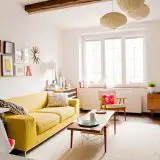Matching Wood Pieces of Different Colors. Consistency and Dynamics
Color and texture variations are essential in interior design. Even if made from the same material, wood, furniture and floor will have different textures and colors, first of all because they will be acquired at different moments. All those different pieces of furniture in our house have been bought, inherited or received in many years and we have to artfully match them with each other and with the flooring. Here are the basics of matching wood pieces of different colors.
Choose either warm or cold colors
The first rule for matching different wood colors is to choose pieces in either warm or cold tones. This way, it will be much easier to mix different shades, lighter and darker.

Decide upon texture
Wood can be more or less rough or polished and it’s good to decide upon the texture you prefer before putting together different pieces. Polished wood is more formal, while a more natural look makes the room warmer.

Matching wood pieces of different colors. Furniture/floor
If you have furniture placed directly on your wood floor of a different color, the difference will only be more obvious. Instead, you can use a carpet to make the passage from one wood color to another smoother. Your rug can combine the two colors or introduce an accent color between the two rather neutral tones.


Go for no more than 3 colors
In the end, don’t choose too many wood colors. Stick to 2 – 3 shades which you can reproduce on several pieces of furniture and accessories.

Paint white
If you have to place next to each other pieces in colors that don’t go together, you can always use white paint on one of them. White wood pieces look clean and elegant and will make the room look more airy and less crowded.

Credits: apartmenttherapy.com, oakfurniturecompany.com















